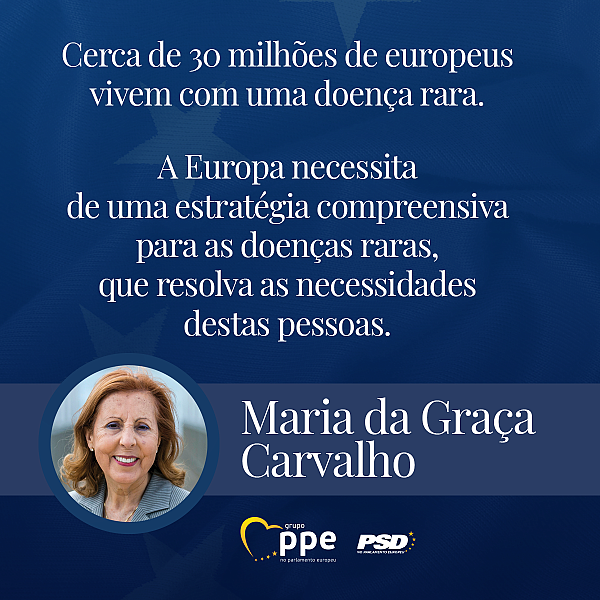Atividade Parlamentar Maria da Graça Carvalho subscreve carta aberta a pedir estratégia europeia para doenças raras
Maria da Graça Carvalho, eurodeputada e vice-coordenadora do PPE na Comissão da Indústria, da Investigação e da Energia (ITRE), esteve entre os 48 deputados que, a 28 de fevereiro, Dia Mundial das Doenças Raras, assinaram uma carta aberta a apelar para que a Europa aposte numa estratégia europeia para as doenças raras.
No documento, endereçado à Presidente da Comissão Europeia, Ursula Von der Leyen, os eurodeputados consideram que uma estratégia concertada entre os vários Estados-membros poderia responder de forma mais eficaz às necessidades dos 30 milhões de cidadãos europeus que vivem com doenças raras, e que todos os dias enfrentam inúmeras dificuldades.
Leia aqui a carta aberta na íntegra em inglês:
Dear Madam President,
28 February 2023 marks the 16th Rare Disease Day, a global awareness day celebrated in over 100 countries around the world. This year, Rare Disease Day puts the focus on equity.
As Members of the European Parliament and on behalf of the Network of Parliamentary Advocates for Rare Diseases, we have the honour to once again call on you to introduce a comprehensive European strategy on rare diseases to better meet the needs of the 30 million European citizens living with a rare disease.
Hearing the first-hand experiences of our constituents living with a rare disease, we know that there is still a long way to go to reach equity in the European Union for this vulnerable population. While an individual’s condition may be rare, people living with a rare disease face common challenges:
- The average time for accurate diagnosis of a rare disease is about 5 years;
- Only 5% of people living with a rare disease have received a transformative treatment approved for the entire EU;
- 22% of people with rare diseases could not get the treatments they needed because they were not available where they live, reflecting the fragmentation of the market across the Member States;
- 52% of people living with a rare disease or their carers say that their condition has a severe impact on everyday life.
The European added value to addressing the needs of people living with a rare disease is exceptionally high, due to the rarity of patients, experts, data and resources. It is true that the European Union has fostered tremendous progress in this area. The upcoming revisions of the general pharmaceutical legislation and Regulation on Orphan Medicinal Products will also offer the opportunity to tackle some of the identified shortcomings and needs. What the European Union is lacking today, however, is an updated cohesive strategy to improve the lives of people living with rare diseases.
An overarching strategy on rare diseases was proposed in the recommendations of a two-year Foresight Study, Rare 2030, initiated by the European Parliament and funded by the European Commission. This is needed to bridge national and European legislation, policies and programmes across the Pharmaceutical Package, the European Health Data Space, European Reference Networks, Europe’s Beating Cancer Plan, EU4Health, Horizon Europe, the Long Term Care Strategy, the European Disability Strategy, and beyond.
The introduction of such a strategy, penned a European Action Plan for Rare Diseases, has recently gathered the support of 21 Member States who endorsed a Call to Action under the Czech Presidency of the Council6, hereby joining the Parliament, the European Economic and Social Committee, the European Court of Auditors and the rare disease community at large. In December 2021, the General Assembly at the United Nations adopted a Resolution on Addressing the Challenges of Persons Living with a Rare Disease recognising the global impact of rare diseases.
There is no option but to work collaboratively in the area of rare diseases. The Conference on the Future of Europe singled out rare diseases as an area to “improve the effectiveness of European governance towards the development of the European Health Union”. In this vein, the ENVI Committee has recently put forward rare diseases to be included as a European competency in the proposals of the Parliament for the amendment of the Treaties.
Fourteen years after the last comprehensive EU strategy on rare diseases, it is time to act and propel rare diseases as an engine for a European Health Union.
This Rare Disease Day, we stand with the rare disease community and respectfully urge you to take forward the
Yours sincerely,
Frédérique Ries, RE, Belgium
Alex Agius Saliba, S&D, Malta
João Albuquerque, S&D, Portugal
Barry Andrews, RE, Ireland
Marc Angel, S&D, Luxembourg
Pascal Arimont, EPP, Belgium
Brando Benifei, S&D, Italy
Izaskun Bilbao Barandica, RE, Spain
Jordi Cañas, RE, Spain
Sara Cerdas, S&D Portugal
Rosanna Conte, ID, Italy
Deirdre Clune, EPP, Ireland
Josiane Cutajar, S&D, Malta
Clare Daly, GUE/NGL, Ireland
Frances Fitzgerald, EPP, Ireland
Claudia Gamon, RE, Austria
Maria da Graça Carvalho, EPP, Portugal
Christophe Hansen, EPP, Luxembourg
Adam Jarubas, EPP, Poland
Radan Kanev, EPP, Bulgaria
Karin Karlsbro, RE, Sweden
Billy Kelleher, RE, Ireland
Ondřej Knotek, RE, Czechia
Kateřina Konečná, GUE/NGL, Czechia
Athanasios Konstantinou, NA, Greece
Ewa Kopacz, EPP, Poland
Stelios Kympouropoulos, EPP, Greece
Katrin Langensiepen, Greens/EFA, Germany
Peter Liese, EPP, Germany
Colm Markey, EPP, Ireland
Radka Maxová, S&D, Czechia
Tilly Metz, Greens/EFA, Luxembourg
Alin Cristian Mituța, RE, Romania
Dolors Montserrat, EPP, Spain
Juozas Olekas, S&D, Lithuania
Piernicola Pedicini, Greens/EFA, Italy
María Soraya Rodríguez Ramos, RE, Spain
Monica Semedo, RE, Luxembourg
Tomislav Sokol, EPP, Croatia
Susana Solís Perez, RE, Spain
Nicolae Ştefănuță, RE, Romania
Véronique Trillet-Lenoir, RE, France
István Ujhelyi, S&D, Hungary
Petar Vitanov, S&D, Bulgaria
Hilde Vautmans, RE, Belgium
Mick Wallace, GUE/NGL, Ireland
Maria Walsh, EPP, Ireland
Isabel Wiseler-Lima, EPP, Luxembourg
